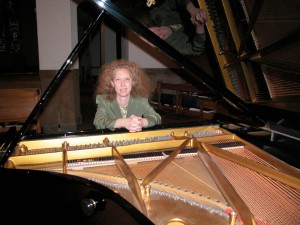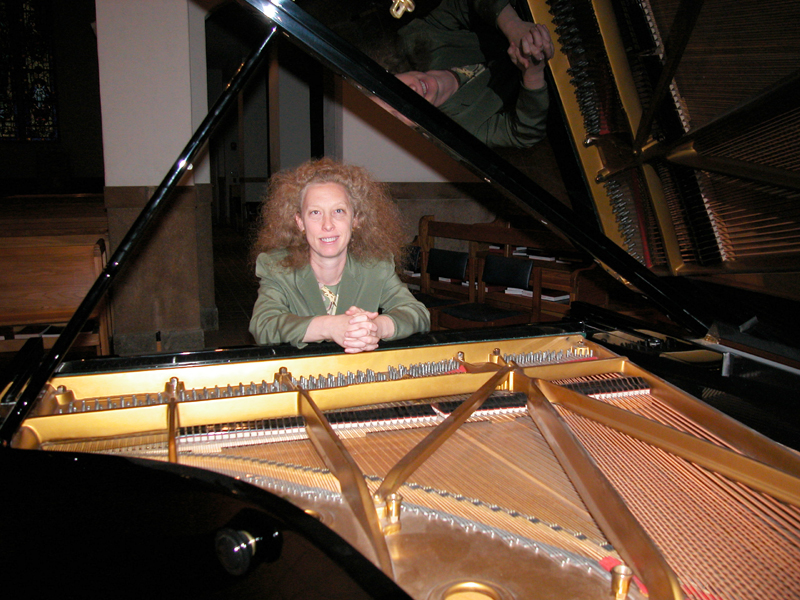The new month brings us a new teacher feature! Say hello to Diane, everyone!
- Name: Diane Heath
- Studio name: Heath Music Studio
- Website: www.dianeheath.org
 Please tell us about your piano and/or teaching background.
Please tell us about your piano and/or teaching background.
I teach part-time, with a studio of 20 – 25 students, and am also a church musician in Washington, DC. For over twenty years I’ve taught piano and organ, as well as K – 12 class-room music, and worked extensively with children and adults in church choirs. Additionally, there was a stretch as a creative home-schooling mom, but now I’m the parent of a college student. My education was at Hartt School of Music, Indiana University, and The Levine School where I earned a certificate in Piano Pedagogy. I’ve been privileged to study with wonderful piano teachers, including Jeffrey Chappell and Alexander Farkas.
Do you have any clever teaching tips you’d love to share with us?
A Suzuki colleague once told me that she taught her students “as fast as possible but as slowly as necessary”. I try to keep that in mind in every practice session, class or lesson.
Tell us about your recitals.
My goal is to create recitals that have a connecting point for all of the students. That way each feels his or her contribution is important to the group effort and they can look forward to the event without undue nervousness because everybody’s in it together. I’ve discovered this sense of “belonging” or having a “reason to be there” is just as important for my preteens and teen students as for the younger ones. This year we’re doing:
- A Music Art Event – Each student will prepare one “character piece” , such as Avalanche by Heller or Reflections in the Pool, by Goldston. One month before the recital students meet for an art workshop, creating visual art that reflects their musical pieces, either representationally or abstractly. The creations will be displayed at the recital, and the printed program will be a puzzle of match-the-performer-to-the-piece of music/art.
- Peter and the Wolf – A story recital for the younger students using Wesley Schaum’s arrangement. The program will also include “Student Composers” – 6th graders and up will compose and play their own music.
- J. S. Bach and friends – A program of music and fun facts about Bach, his family, and other composers of the time, using piano, organ and harpsichord.
With only 20 – 25 students, I’m able to keep programs to one hour or less while having all ages and levels together. Parents comment on how this inspires both beginning and advanced students. The story recitals are also wonderful for young siblings.
What is your favorite teaching game to use with your students?
A standard that I return to again and again with beginners and even intermediate students for support doing repetitions is my famous “Dice Game” Equipment needed: a little bowl and a die (these are never far from my piano). Divide a short piece of music into 5 numbered sections that need work, or choose 5 things to practice. Roll the die and play whatever section it says. If the student rolls 6, that means “You Pick”. It’s also possible to choose 4 things to practice and have 5 be “play the whole thing”. I use the game both in lessons and for home assignments. The game should be played until every number has been rolled. This will take a fair amount of time, and ends up being excellent practice! Some ways to vary the game are:
- play the section
- play it with no mistakes
- play the section 3 times with no mistakes
- play the section 2 times in a row with no mistakes
- etc – there are many ways to use the game.
What is your favorite supplementary book to use with your students?
One book that I’ve been very happy to share with both adults and teens is “The Jobim Collection” (easy piano). The collection, for advanced beginner/early intermediate students, includes Quiet Nights of Quiet Stars as well as other sambas and bossa novas in accessible and harmonically satisfying arrangements. Hal Leonard HL 00316035
What is your favorite piano related book?
“Piano Lessons” by Noah Adams – a beautifully written memoir by the NPR commentator about one year of learning to play piano as an adult.
Does your studio have a minimum practice requirement?
30 minutes six days per week, except for very young beginners. Does everyone meet it? Well, a few are still working toward this goal 🙂
Do you use stickers or other motivations devices?
Funny you should ask. For years I avoided stickers or any rewards, thinking all motivation needed to be intrinsic. Then a sophisticated 17-year-old transfer student taught me to use stickers because her previous teacher always had. The stickers were not so much a way of rewarding as a moment for us both to pause and say, “Good Job!”. Now I have an elaborate sticker system to help both students and myself keep track of accomplishments in sight-reading, improvising, repertoire, technique and special projects such as recitals. It keeps the music work moving forward nicely.
Thanks so much for sharing with us, Diane!
* * * * *
If anyone has more questions for Diane, you can contact her via email at dianeheath[at]verizon.net. Or, leave your responses in the comments below!




Nice to “meet” you, Diane! I love the dice game you play – I know some of my students would really benefit from an activity like that.
Thanks for including me in your wonderful website!
Thanks for taking the time to be interviewed, Diane! It turned out great!
Some really wonderful and unique ideas Diane! I really like how creative you have been with creating the Music Art Event recital. What a great theme 🙂
Hello Diane, These are all wonderful suggestions! I love your recital philosophy, and I second the good read, “Piano Lessons” by Noah Adams. Thank you for inviting us to peek into your studio.
Thanks for the great Piano Dice Game idea. I love to use games with my students. Very inspiring.